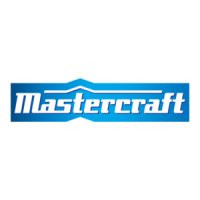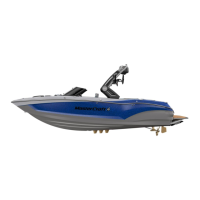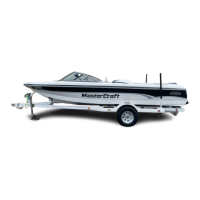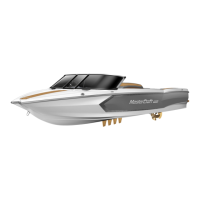343
/
2023 OWNER’S MANUAL
Engines should always be operated within engine manufacturer
guide lines. Failure to do so may cause significant damage to the
engine and drive train and is not covered under warranty!
Elevation and weather also have a very noticeable eect on the
wide open throttle power of an engine. Since oxygen gets thinner
as elevation increases, the engine begins to starve for air. Humidity,
barometric pressure and temperature have a noticeable eect on
the density of air since heat and humidity thin the air.
This phenomenon can become particularly apparent when an
engine is propped for use on a cool, dry day in spring and then is
operated on a hot, humid day in summer, and does not have the
same performance. Although some performance can be regained
by dropping to a lower-pitch propeller, the basic condition still exists.
The propeller is too large in diameter for the reduced power output.
An experienced marine dealer can determine how much diameter
to remove from a lower-pitch propeller for specific high-elevation
locations.
MasterCraft’s engine manufacturer suggests that consumers
consult with the dealer from whom the boat was purchased
regarding the best propeller for the application in which the boat will
primarily be run. However, be aware that changing the propeller may
void the warranty. Again, working with an authorized MasterCraft
dealer is your best bet to ensure excellent performance.
UNUSUAL OPERATING
CONDITIONS
If the body of water is unknown, talk to local boaters about the
type of obstacles that may be encountered beneath the water’s
surface. Rocks, tree stumps and sandbars are all dangerous
and damaging. Be especially wary of rivers and man-made
lakes. Rapidly changing conditions can cause daily changes in
underwater hazards.
Stay well clear of floating debris. What looks to be a small branch
in the water may well turn out to be an entire tree. When traveling
through weedy areas, keep an eye on the engine temperature
gauge. Weeds caught up and blocking the water flow through the
raw water intake or transmission cooler will cause trouble. Also,
after leaving the weedy area, shift to neutral for a few seconds and
then to reverse for a few seconds to unwind any weeds that may
have wrapped around the propeller.
DOCKING AND TIE-UP
Approach the dock slowly, with the starboard side of the boat if
possible. The natural tendency of traditional inboards is to torque

